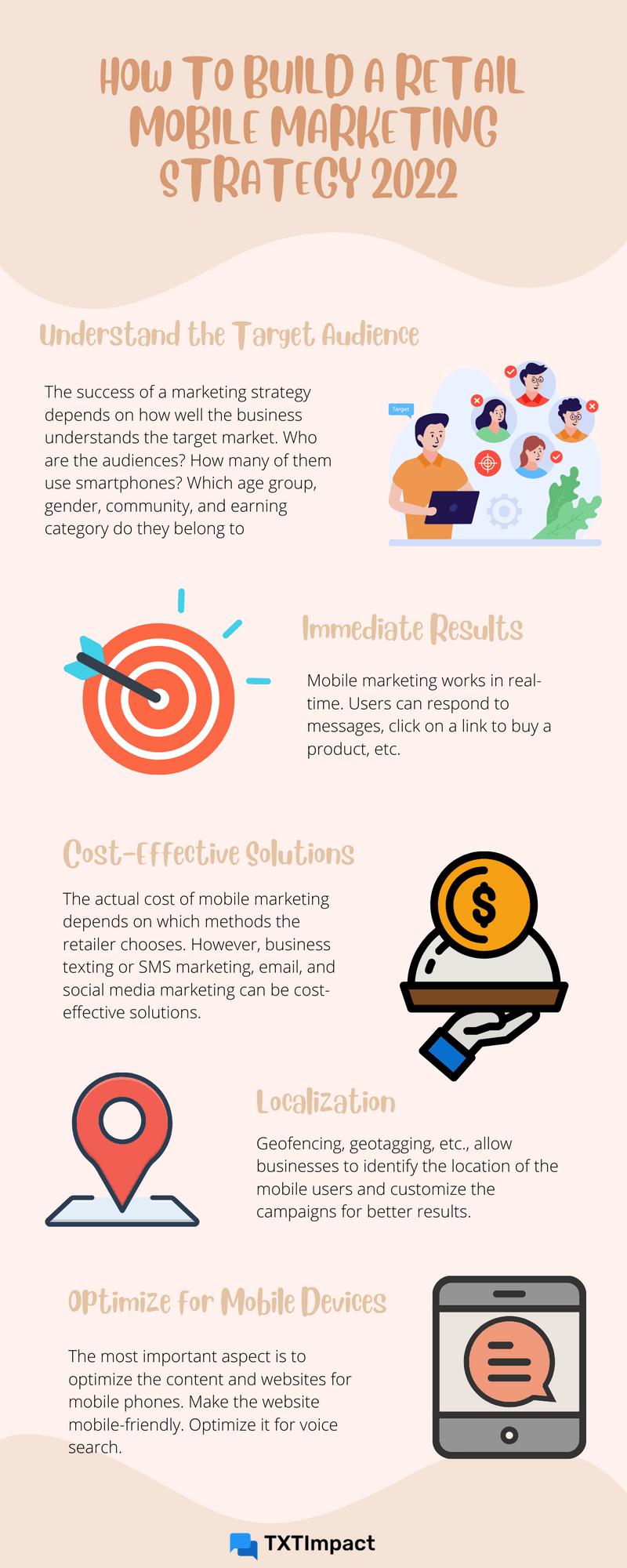Smartphones are a part of our lives and an extension of our hands (as many people like to joke). Globally, there are more than six billion smartphone users, according to Statista. The count is expected to touch 7.69 billion by 2026.
In such instances, businesses, especially retailers, need to rework their marketing strategies to reach a wide range of audiences. Mobile marketing is not a new trend but is becoming increasingly popular in recent times. So what is mobile marketing? How does a retailer develop a mobile marketing strategy to increase sales and revenue?
Let’s read and find out!
What is Mobile Marketing?
Mobile marketing is a broader term that covers different marketing strategies and processes to attract mobile phone users to the retail store or eCommerce website. It includes a range of channels such as SMS/ texting, social media, email, content marketing, and more. Mobile marketing strategies are similar to digital marketing except that the primary focus is on how well the campaign is aligned to work on mobile phones.
The strategies focus on the what, why, how, and when of reaching and convincing a potential customer through mobile devices. The target audiences are mobile users with preferences and interests in the products/ services of a business.
Reasons to Use Mobile Marketing for Retail
So, why should retailers use mobile marketing to promote their business? How does this marketing method boost sales and increase customers?
Easier Access to Target Audiences
Who doesn’t have a mobile phone in today’s world? Even if someone doesn’t own a smartphone, they are likely to have a regular, old-model mobile phone. This naturally increases the reach of a retail business and attracts more customers to the stores.
Immediate Results
Mobile marketing works in real-time. Users can respond to messages, click on a link to buy a product, etc. Since people carry mobile phones with them, convincing them to place an order immediately is easy.
Cost-Effective Solutions
The actual cost of mobile marketing depends on which methods the retailer chooses. However, business texting or SMS Marketing, email, and social media marketing can be cost-effective solutions. There is no charge to chat with a customer on Facebook Messenger.
Localization
Geofencing, geotagging, etc., allow businesses to identify the location of the mobile users and customize the campaigns for better results. For example, sending an SMS to a customer about the in-store discount in their location will interest them more and urge them to visit the store to check out the offer.
Understanding the Challenges
Building a perfect mobile marketing strategy is possible when business owners and retailers understand the challenges and find ways to overcome the roadblocks.
• Given the short attention span of people, it is vital to get the message right the first time.
• Don’t expect users to spend their valuable mobile data to watch your promotional videos. Use a channel that is cost-effective/ free for the audiences.
• Don’t overemphasize mobile marketing. Users don’t like it when a brand sends them multiple campaigns every day.
Steps to Build a Retail Mobile Marketing Strategy in 2022
Here’s how to build a retail mobile marketing strategy in 2022:
Understand the Target Audience
The success of a marketing strategy depends on how well the business understands the target market. Who are the audiences? How many of them use smartphones? Which age group, gender, community, and earning category do they belong to? Segmentation is necessary to plan customized mobile marketing strategies for each group.
Set Achievable Goals
Retailers have short-term, mid-term, and long-term goals for their business. They need to set similar goals for their mobile marketing campaigns. Why are they running the campaign? What are they doing to implement the strategies? Are the goals achievable for the chosen period? The objectives and goals need to be as clear as possible for the campaigns to become successful.
Try Different Mobile Marketing Strategies
As we mentioned earlier, there are different methods to reach mobile users. Retailers should explore the options before choosing the most suitable one for their purposes. For example, if the target audiences opt for SMS marketing, there is no point in sending emails or social media links. Using Business Text Marketing software will not only be affordable but will also deliver the expected results.
Optimize for Mobile Devices
The most important aspect is to optimize the content and websites for mobile phones. Make the website mobile-friendly. Optimize it for voice search. Create content that can be easily viewed and shared on mobile devices.
Final Words
TXTImpact, a leading business text messaging service provider in the US, says that mobile marketing for retail businesses will bring customers to the stores and website. It helps attract different kinds of users to the business.


